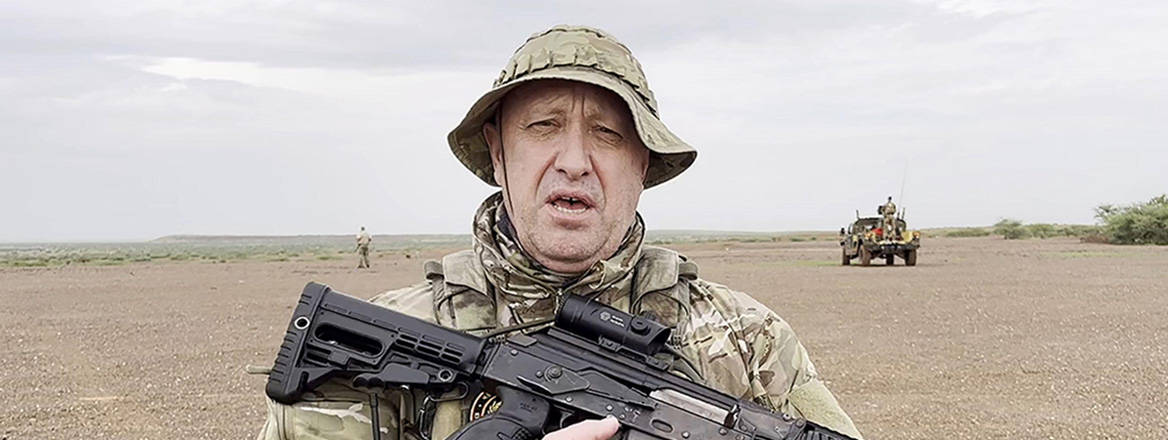Prigozhin’s Death: The Details Don’t Matter – It’s What You Do With It
The details of the now-officially confirmed death of Yevgeny Prigozhin, leader of the Wagner Group private military company, matter far less than how the political elite – and the Russian public – decide to interpret it, and what they do with it next.
There are important questions about what Prigozhin’s demise means for the future of loyal Wagnerites currently residing in Belarus; about the implications for Wagner’s activities abroad, particularly in Africa; and about what messaging this may have for any others in Prigozhin’s position.
But whether the Kremlin is ultimately responsible for Prigozhin’s demise or not, the most pressing question for President Vladimir Putin himself will be whether these events have been sufficient to quash any of the after-effects of Prigozhin’s short-lived rebellion two months ago, and whether this will have any serious implications for the upcoming election cycle.
Consequences of the Rebellion
There have been several events since Prigozhin’s rebellion that merit closer examination as they suggest subtle shifts in Russia’s political environment, all of which are likely linked to the September 2023 regional elections and the March 2024 presidential elections.
First, since Prigozhin’s mutiny, the Kremlin has taken restrictive steps to prevent a similar recurrence, and has boosted internal security in a number of specific ways. In a direct response to the rebellion, one of the most visible of these was to give regional governors the authority to establish their own private military companies, designed to counter domestic uprisings. These paramilitary units would have a role not only in defending Russia’s borders – as beleaguered border regions such as southern Belgorod have come under increasing attack from insurgent anti-Kremlin groups in recent months – but also from internal dissent. This suggests that Moscow is taking seriously the idea that figures similar to Prigozhin might appear, and that the Kremlin needs to be prepared.
Second, it was revealing that in the wake of Prigozhin’s death, one of the Kremlin’s first actions was to call the Rosgvardia (National Guard) back from its holidays in Rostov where the rebellion first occurred, and to put all security services on high alert. It was evident that the Kremlin expected some sort of backlash to his death, although none has yet come.
Impact on Domestic Policy
But perhaps the most significant yet under-reported changes in the past two months have taken place within Russia’s domestic political scene. There have been several well-documented dismissals of senior officials within the Ministry of Defence thought to have been allies of Prigozhin, including General Sergei Surovikin, who was relieved of his command of the aerospace forces the day before Prigozhin was killed.
The upcoming elections are an important litmus test of support for Putin’s ruling party, and an opportunity to gauge public approval of the government’s management of the war
But less obviously, rubbing shoulders with Prigozhin has had a more dramatic impact on Russia’s political parties. A Just Russia, part of the so-called ‘systemic opposition’ – which rarely votes against United Russia’s bills and currently holds 28 out of the 450 seats in the Duma – appeared to have a short-lived flirtation with Prigozhin, which has resulted in its numbers being all but decimated since the rebellion. Several party members, including its leader Sergei Mironov, had taken a softer position on Prigozhin prior to the rebellion, referring to him as a ‘dear friend’ even amid his staunch criticism of the Ministry of Defence.
Mironov was notoriously pictured with a sledgehammer that Prigozhin had gifted him, which had been used by other Wagnerites to kill a former Russian prisoner who had returned from captivity in Ukraine. Mironov’s hastening to explain that he did not support the rebellion itself but considered the Wagner fighters to be ‘true patriots’ has caused something of an uproar within the party, and it has lost several prominent members, keen to distance themselves from his comments.
Ordinarily, this might be of little consequence, but Russia has two very important political processes that are about to begin. The first is the September regional elections, where thousands of seats on regional and local councils, as well as regional leadership positions, are up for grabs. This is part of an election cycle that will culminate in the presidential elections in March 2024, where Putin is expected to stand for yet another term of office.
These elections are an important litmus test of support for Putin’s ruling party, United Russia, and an opportunity to gauge public approval of the government’s management of the war. As can be seen from many early regional election campaigns – which tend to be given freer rein to individualise their campaign slogans – much of the messaging is tied to the war, with Z symbols, inspirational military phraseology and patriotism dominating the information campaign.
A Just Russia’s reputational damage due to its links to Prigozhin will likely have serious consequences for the upcoming elections; it is often considered the party of second choice and an alternative to United Russia while still retaining ultimate support for Putin, but is now polling the lowest of the four parties, with just 2.5% of the vote.
Do Elections Matter?
Even in a country where the political opposition has been imprisoned, exiled abroad or eliminated entirely, elections do matter. In a system such as Putin’s where information is tightly controlled and – as has been evidenced throughout the current war in Ukraine – bad news or honest reporting is rarely passed up the chain of command for fear of reprisal, it is increasingly challenging for the Kremlin to determine what is happening in its own country. For this reason, Kremlin-friendly surveys and elections are two of the best methods of gauging public trust in institutions and the president, as well as attitudes to the war.
There could be something for the Kremlin to learn about outreach to the public and the attractiveness of Prigozhin's messaging to a certain part of society
Elections allow the Kremlin to also determine which political figures are a threat and where their support is based. High turnout and high percentages of votes for United Russia representatives could suggest either that a governor is genuinely popular, that they have been able to manipulate election processes sufficiently to garner votes in their favour, or that they have run a skilful election campaign. All of these give the Kremlin an idea of which politicians can be trusted, and which ought to be dismissed.
These elections are also a test of the war – if the messaging around the conflict sufficiently galvanises voters in support of United Russia and suggests that the Russian public are more inclined to support the war than not, this sends an important message abroad, especially to NATO members supporting Ukraine. Ideas about a swift end to the conflict may then be more likely to be put to rest.
Prigozhin’s Actual Legacy
Prior to his death, there were numerous rumours that Prigozhin himself had intended to run on the presidential ballot. An additional survey by pro-Kremlin news outlet Tsargrad in June conducted a telephone survey, finding that Putin would win if pitted against Prigozhin with 61.9% of the vote, but that Prigozhin would come second with 8.9%, with the leaders of other political parties lagging far behind – the most popular, the Communist Party, polled just 3.5%. Other independent polls indicate similar results, with Prigozhin repeatedly coming second to Putin in elections and outstripping even incarcerated leader of the opposition Alexei Navalny.
Whether or not Prigozhin actually intended to run in the elections is immaterial, and now even less relevant. But it is a useful datapoint for the Kremlin as it shows that Prigozhin held a certain celebrity status, despite never holding an official political position or launching a targeted presidential campaign. There could be something for the Kremlin to learn about outreach to the public and the attractiveness of his messaging to a certain part of society that United Russia – and Putin – will now have to appeal to.
The views expressed in this Commentary are the author’s, and do not represent those of RUSI or any other institution.
Have an idea for a Commentary you’d like to write for us? Send a short pitch to commentaries@rusi.org and we’ll get back to you if it fits into our research interests. Full guidelines for contributors can be found here.
WRITTEN BY
Emily Ferris
RUSI Senior Associate Fellow, International Security
- Jim McLeanMedia Relations Manager+44 (0)7917 373 069JimMc@rusi.org


